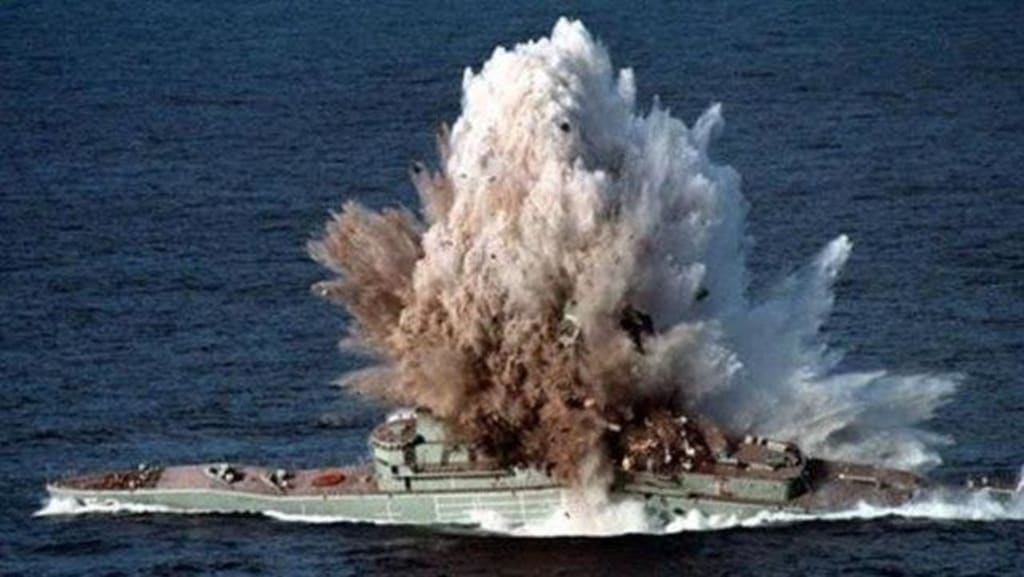Why are bombs more powerful when they explode underwater?
Why underwater explosions are more powerful

In some police and bandit films, we can often see the protagonist jump into the water to avoid the pursuit, and then a large number of pursuers shoot at the water surface.
In fact, because the resistance of the water is too great, the bullet will be quickly decelerated after entering the water, and then become almost no lethality.
However, there is an interesting fact that another weapon - a grenade or other bomb, is many times more destructive if it explodes underwater than it does on water.
What is the main source of the bomb's power?
Except for nuclear bombs, all other bombs burn or break down chemical elements at an astonishing rate to create destructive power. The intense chemical reaction produces a large amount of heat and gas in a very short period of time.
And these heat and gas are compressed in a very small space. When the gas itself expands due to the increase, the heat also intensifies the expansion of the gas, which eventually leads to explosion.
There are three main types of lethality from this blast: fragmentation, photothermal radiation, and shock waves.
The shell of the grenade is often designed as an egg-shaped structure composed of many squares, in fact, these small squares can cause damage when it explodes, which is called fragmentation.
Due to the short throwing distance of the grenade, in order not to hurt itself, its explosive power will not be very strong, so it is necessary to increase the lethality of this fragment.
Regarding photothermal radiation, in fact, any bomb will produce this lethality, because the compressed gas will also generate heat, but there is one bomb that achieves this to the extreme - that is, the white phosphorus bomb.
The explosive power of the white phosphorus bomb is also not very strong, but it will create lethality by releasing a flammable material that burns in the air.
In fact, the real power of the bomb does not come from these two methods, but the shock wave. If a bomb is to blow up a building, it needs a strong shock wave, not more fragments and light and heat.
It can be said that the power of an ordinary bomb is not strong, depending on how much shock wave it can generate, and the shock wave is caused by the drastic changes in the internal pressure, temperature and density of the bomb, which depends on the shell material and the equivalent of the internal explosive material.
A shock wave, like a normal wave, carries energy and travels through the medium, so it can destroy objects or propel fragments forward.
However, it travels faster than the speed of sound, so the sound of the explosion is actually a sonic boom when the shock wave is generated.
For an organism, when exposed to a shock wave propagating through the air, the body actually reflects most of the force because the body is much denser than those fast-moving gas molecules.
However, some organs of our body contain gas, which means that these gases are compressed and expanded by the shock wave like air, and the result is implosion in the organs, so when the shock wave is encountered, it is often those gas-containing organs that rupture, such as the lungs Body, intestines and ears, this process is similar to the situation in the movie Romance of the Lion's Roar.
Why are underwater explosions more powerful?
Having said all that, what does this have to do with underwater explosions being more powerful?
The relationship is that the shock wave gradually loses energy in the process of compressing and expanding the propagating medium (air), and water is generally considered to be incompressible (water can only be compressed under extreme pressure), which means that if the shock wave propagates in water, Basically no energy is lost due to this.
In addition, water is much denser than air, and much heavier within the same blast range (volume), which means that the shock wave can hardly push the water like air, and as a result, less energy is lost.
These two properties combine to make water an excellent propagation medium for blast shock waves, in which very little of its energy is lost.
In fact, to be precise, it is not that the power of the explosion in the water is greater, but that its energy can spread more and farther.
For the same grenade, no matter where it explodes, the energy it releases is basically the same, but when it is in the air, due to the rapid loss of shock wave energy, its lethality can eventually affect a smaller range.
Let me mention the explosion of a nuclear bomb again. In fact, a nuclear bomb that explodes in water will not only produce more power, but it will also create more nuclear pollution, because it is not only the product of its own nuclear reaction, but also the impact of neutron exposure on water.
Although, both elements of water (H2O) will absorb neutrons and become deuterium and oxygen-17 respectively, but fortunately these two are stable isotopes.
However, in the case of seawater, both elements of sodium chloride (NaCl) will also absorb neutrons, resulting in sodium-24 and chlorine-36, both of which are radioisotopes, of which sodium-24 has a half-life of only 15 hours, the half-life of chlorine-36 is 300,000 years.
If a nuclear bomb were to be detonated in seawater, in addition to the huge shock wave it would produce, sodium in seawater would be the most dangerous contaminant because of its short half-life.
at last
Although it is a little counter-intuitive that the power of the explosion in the water will be greater, it is estimated that many people have experienced it, but they may not have noticed it.
A typical example is when I was playing with firecrackers when I was a child. If the firecrackers were thrown directly into the glass bottle, it was generally difficult to break the glass bottle, but if water was added, the glass bottle would be easily shattered.
About the Creator
adalberto alejandrina
scientific exploration






Comments
There are no comments for this story
Be the first to respond and start the conversation.